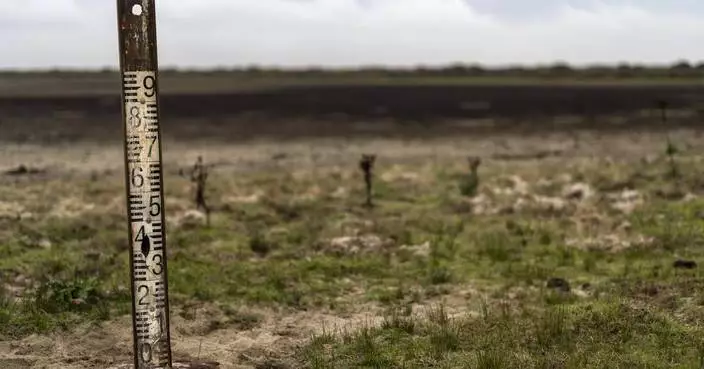CAIRO (AP) — The Iranian-backed Houthi rebels in Yemen on Sunday released more than 100 war prisoners linked to the country’s long-running conflict, the International Committee of the Red Cross said.
The unilateral release came more than a year after Yemen’s warring sides freed more than 800 prisoners in a major exchange in the country in April last year.
The release of 113 prisoners took place Sunday morning in the Houthi-held capital of Sanaa, the Red Cross said in a statement, adding that the released detainees were among those the ICRC visited and assisted regularly in their detention in the Yemeni capital.
“We hope this paves the way for further releases, bringing comfort to families eagerly anticipating reunification with their loved ones,” said Daphnee Maret, the ICRC’s head of delegation in Yemen.
One of the released detainees with health issues was transferred in an ambulance to his hometown inside Yemen, the ICRC said without elaborating.
The release was delayed by a day because of apparent logistical reasons, said Abdul-Qader al-Murtaza, a Houthi official in charge of prisoner exchange talks.
Thousands of people are still believed to be held as prisoners of war since the conflict erupted in 2014, with others missing. The Red Cross viewed Sunday’s releases as a “positive step” to revive prisoner exchange negotiations.
“We are ready to play our role as a neutral intermediary in facilitating the release, transfer, and repatriation of detainees,” it said.
Yemen was plunged into a devastating conflict when the Houthis descended from their northern stronghold and seized Sanaa and much of northern Yemen, forcing the government into exile.
A Saudi-led coalition including the United Arab Emirates intervened in 2015 to try to restore the internationally recognized government. The conflict has turned in recent years into a proxy war between Saudi Arabia and Iran. More than 150,000 people, including fighters and civilians, have died in one of the world’s worst humanitarian disasters.

Houthi supporters march marking the anniversary of Yemeni unity in Sanaa, Yemen, Wednesday, May 22, 2024. (AP Photo/Osamah Abdulrahman)
MINA, Saudi Arabia (AP) — Muslim pilgrims used the early morning hours Monday to perform the second day of the symbolic stoning of the devil, as noontime summer heat caused heatstroke among thousands wrapping up the Hajj pilgrimage.
The final days of the Hajj coincide with Muslims around the world celebrating the Eid al-Adha holiday.
The stoning of the pillars representing the devil takes place in Mina, a desert plain just outside the city of Mecca in Saudi Arabia. A third stoning is scheduled Tuesday, before the Farewell Tawaf, or circling the cube-shaped Kaaba in Mecca.
The Hajj pilgrimage is one of the Five Pillars of Islam. All Muslims are required to make the five-day Hajj at least once in their lives if they are physically and financially able to do so.
More than 1.83 million Muslims performed Hajj in 2024, slightly less than last year’s figure of 1.84 million, according to Saudi officials.
The Hajj rites largely commemorate the Quran’s accounts of Prophet Ibrahim, his son Prophet Ismail and Ismail’s mother Hajar — or Abraham and Ismael as they are named in the Bible.
The rites have taken place under the soaring summer heat, which is expected to reach 49 degrees Celsius (120 degrees Fahrenheit) in Mecca and the sacred sites in and around the city, according to the Saudi National Center for Metrology.
“Of course, it is something very hard and tiring. The temperature is abnormal compared to the past years and this affects us a lot,” said Ahmed Al-Baradie, an Egyptian pilgrim, after finishing his second symbolic stoning.
More than 2,760 pilgrims suffered from sunstroke and heat stress on Sunday alone at the start of the first round of stoning, according to the Health Ministry. Jordan announced Sunday that 14 Jordanian pilgrims had died from heatstroke.
The number of pilgrims on the roads leading to the pillars Monday morning decreased significantly compared to Sunday.
Carrying an umbrella against the burning sun, Pakistani pilgrim Khoda Bakhch visited the stoning site on Monday morning and planned to return at sunset. “After two or three hours, it (temperature) may be too much," he said.
Security forces, medics and first responders have been deployed in and around Mina, especially on roads and open areas to direct and help pilgrims.
“I am really impressed by the preparations,” Sani Abdullah, a Nigerian, told The Associated Press, adding that he was used to such burning heat in his country. “I have never encountered any problems. Everything is going smoothly.”
Mina is where Muslims believe Ibrahim’s faith was tested when God commanded him to sacrifice his only son Ismail. Ibrahim was prepared to submit to the command, but then God stayed his hand, sparing his son. In the Christian and Jewish versions of the story, Abraham is ordered to kill his other son, Isaac.
The stoning began Sunday, a day after the pilgrims visited the sacred Mount Arafat where they spent their day in worship and reflection. The ritual in Mount Arafat, known as the hill of mercy, is considered the peak of the Hajj pilgrimage.
The pilgrims collected the pebbles, which they have used in the symbolic stoning of pillars, from Muzdalifa, an area located a few kilometers (miles) away from Mount Arafat.
The Hajj is one of the largest religious gatherings on earth. The rituals officially started Friday when the pilgrims moved from Mecca’s Grand Mosque to Mina, then to Mount Arafat. They then return to Mina, where they spend up to three days, each casting seven pebbles at three pillars in a ritual to symbolize the casting away of evil and sin.
While in Mina, the pilgrims visit Mecca to perform a “tawaf,” or circumambulation, which is circling the Kaaba in the Grand Mosque counterclockwise seven times. Then another circumambulation, the Farewell Tawaf, will mark the end of the Hajj as pilgrims prepare to leave the holy city.
Once the Hajj is over, men are expected to shave their heads, and women to snip a lock of hair in a sign of renewal.
Most of the pilgrims then leave Mecca for the city of Medina, about 340 kilometers (210 miles) away, to pray in Prophet Muhammad’s tomb, the Sacred Chamber. The tomb is part of the prophet’s mosque, which is one of the three holiest sites in Islam, along with the Grand Mosque in Mecca and the Al Aqsa Mosque in Jerusalem.
This year’s Hajj came against the backdrop of the devastating Israel-Hamas war, which pushed the Middle East to the brink of a regional conflict.
The war has killed more than 37,000 Palestinians in the besieged strip, according to Gaza health officials, while hundreds of others have been killed in Israeli operations in the West Bank. It began after Hamas-led militants attacked Israel on Oct. 7, killing about 1,200 people and taking around 250 hostage.
Palestinians in the Gaza Strip weren’t able to travel to Mecca for the Hajj this year because of the closure of the Rafah crossing in May, when Israel extended its ground offensive to the city on the border with Egypt.
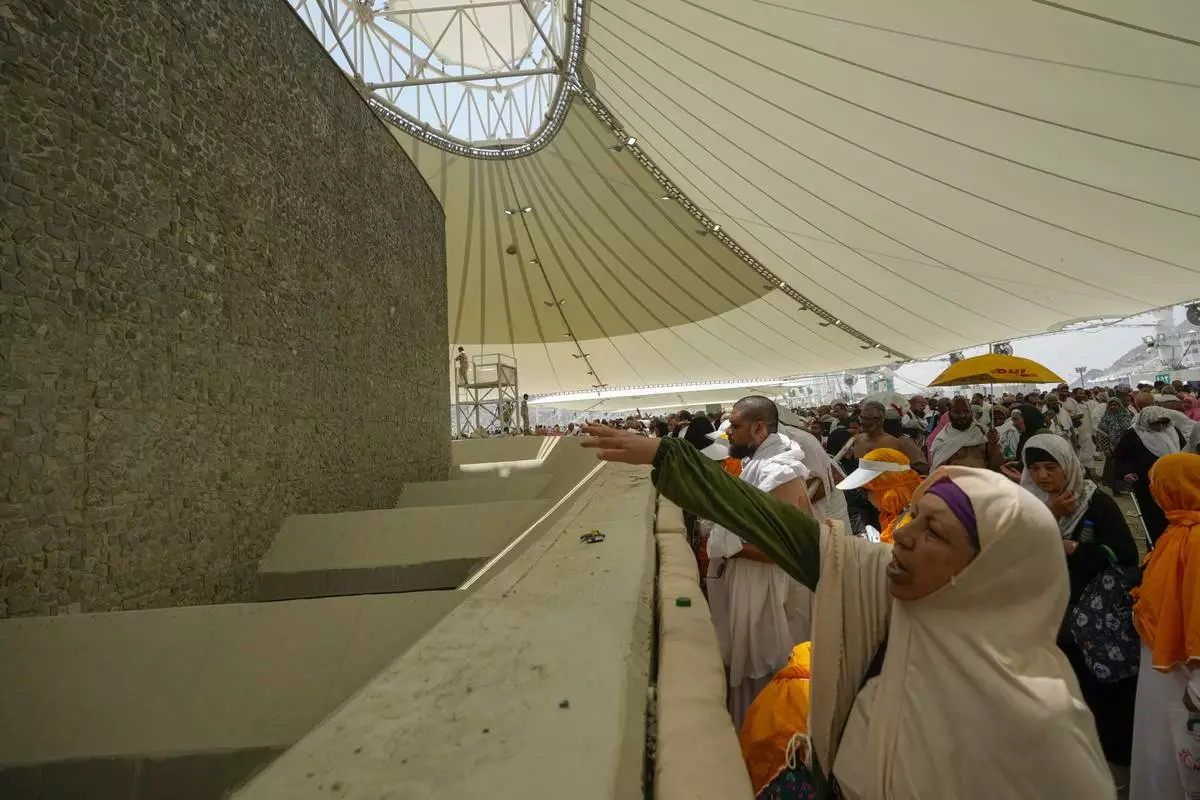
Muslim pilgrims cast stones at pillars in the symbolic stoning of the devil, the last rite of the annual hajj, in Mina, near the holy city of Mecca, Saudi Arabia, Sunday, June 16, 2024. Masses of pilgrims on Sunday embarked on a symbolic stoning of the devil in Saudi Arabia. The ritual marks the final days of the Hajj, or Islamic pilgrimage, and the start of the Eid al-Adha celebrations for Muslims around the world. (AP Photo/Rafiq Maqbool)
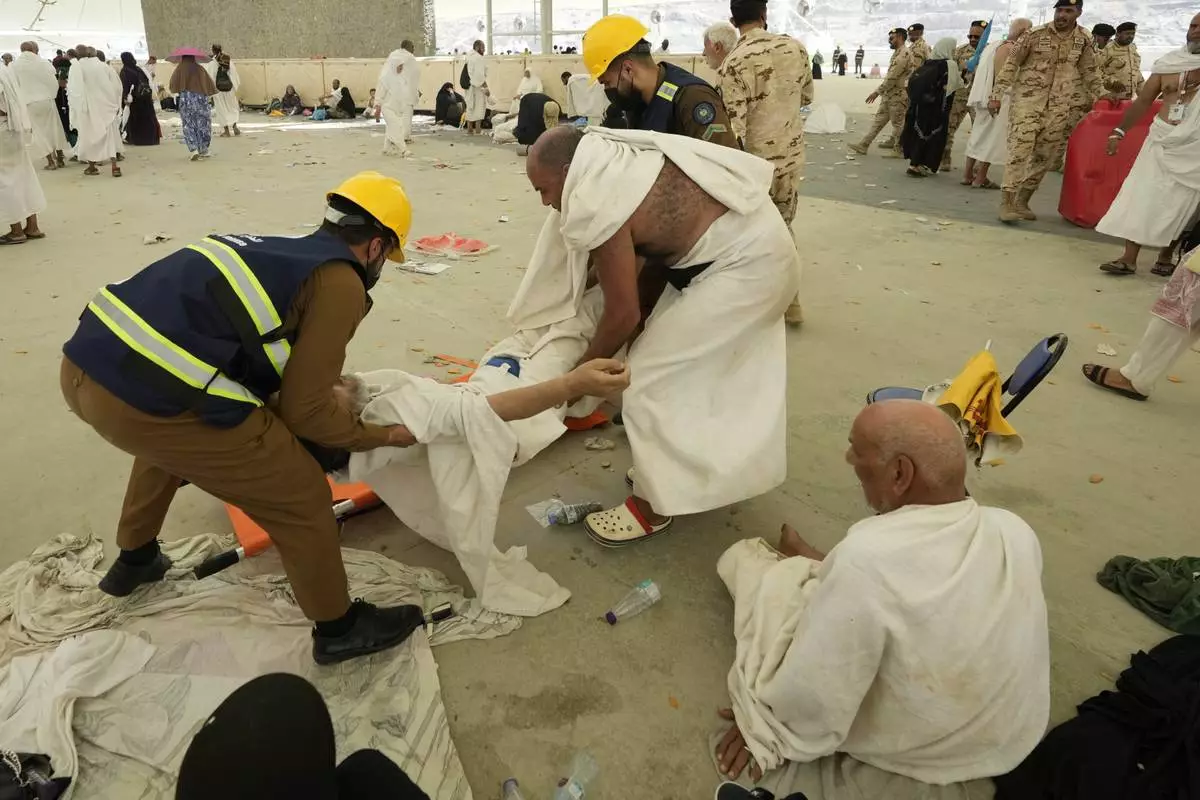
Paramedics carry a muslim pilgrim for a medical check after he fell down due to a heat stroke at pillars, in Mina, near the holy city of Mecca, Saudi Arabia, Sunday, June 16, 2024. Masses of pilgrims on Sunday embarked on a symbolic stoning of the devil in Saudi Arabia. The ritual marks the final days of the Hajj, or Islamic pilgrimage, and the start of the Eid al-Adha celebrations for Muslims around the world. (AP Photo/Rafiq Maqbool)
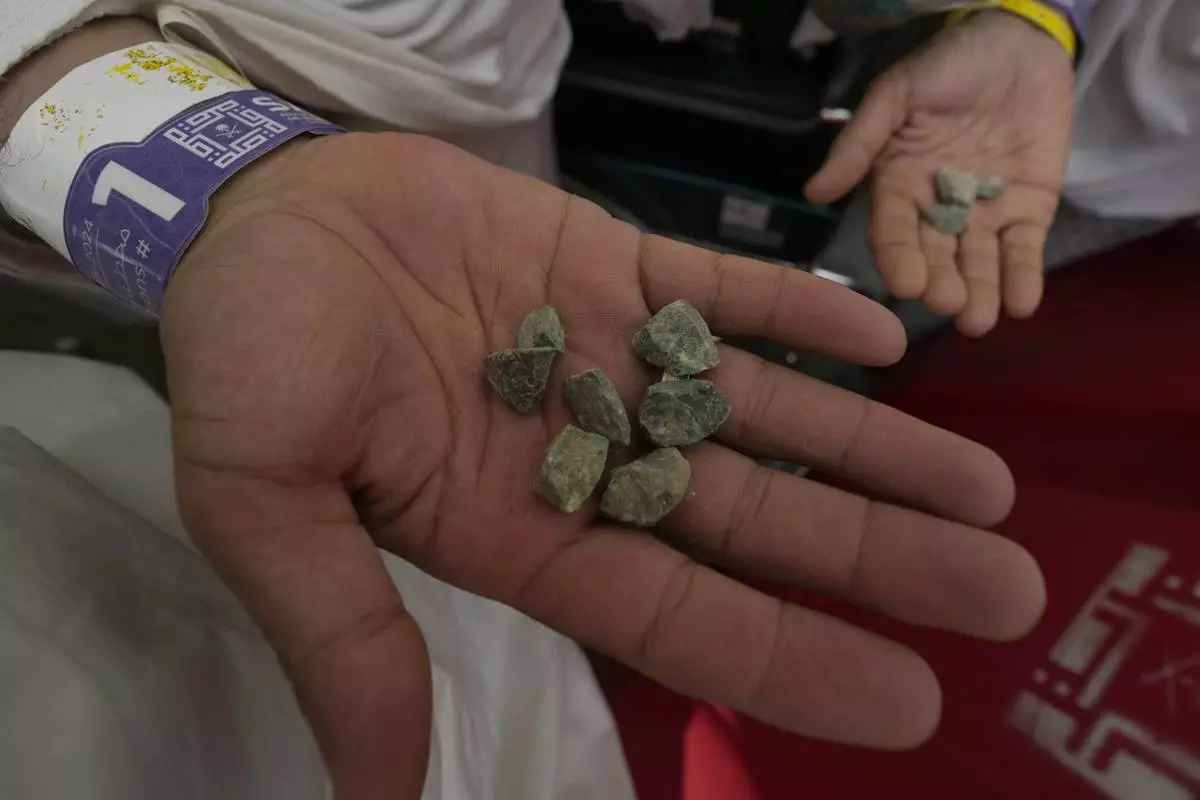
A pilgrim prepares to cast stones at a pillar in the symbolic stoning of the devil, the last rite of the annual Hajj pilgrimage, in Mina near the holy city of Mecca, Saudi Arabia, Sunday, June 16, 2024. Masses of pilgrims on Sunday embarked on a symbolic stoning of the devil in Saudi Arabia. The ritual marks the final days of the Hajj, or Islamic pilgrimage, and the start of the Eid al-Adha celebrations for Muslims around the world. (AP Photo/Rafiq Maqbool)
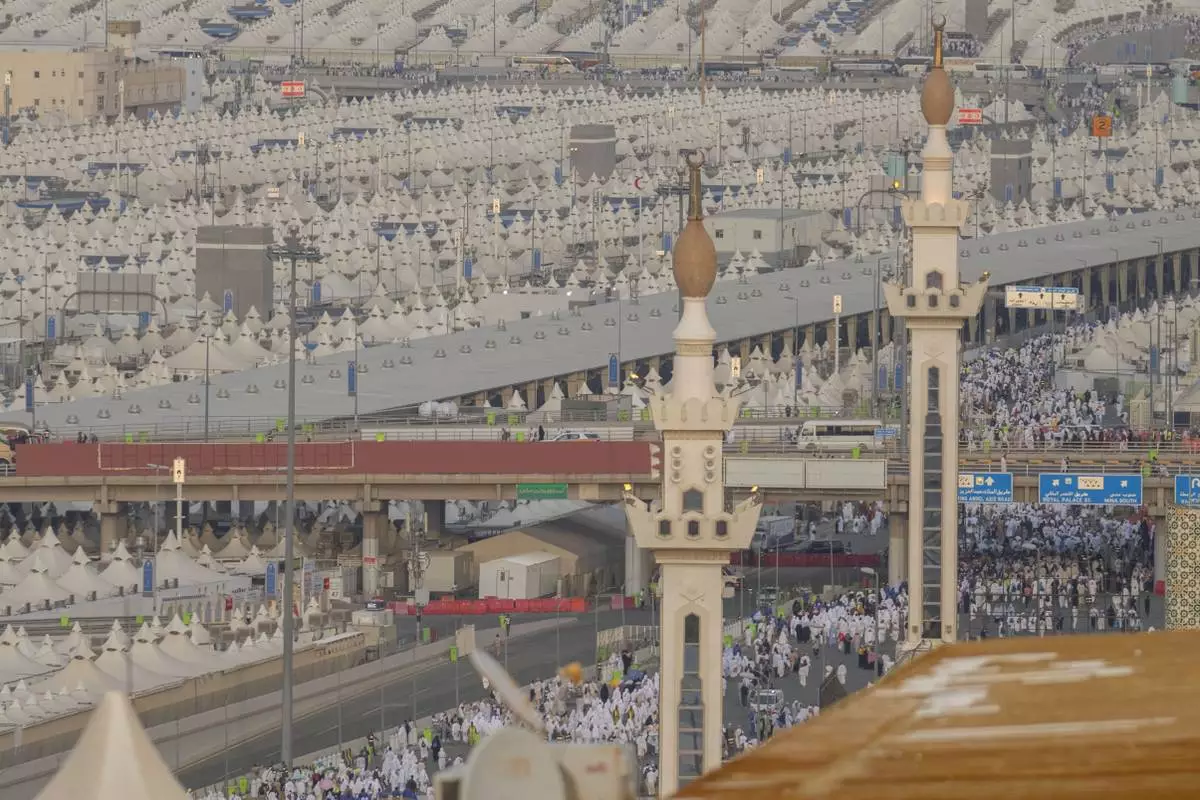
Muslim pilgrims arrive to cast stones at pillars in the symbolic stoning of the devil, the last rite of the annual hajj, in Mina, near the holy city of Mecca, Saudi Arabia, Sunday, June 16, 2024. The ritual marks the final days of the Hajj, or Islamic pilgrimage, and the start of the Eid al-Adha celebrations for Muslims around the world. (AP Photo/Rafiq Maqbool)
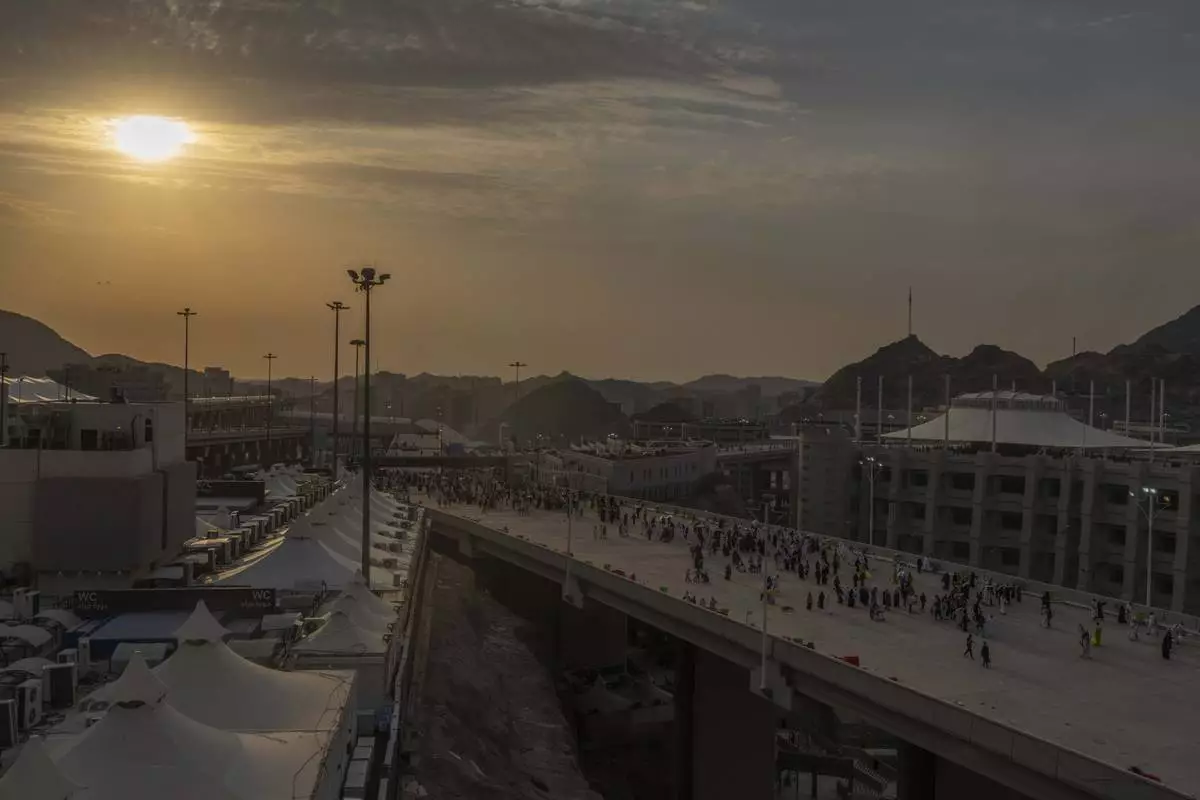
Muslim pilgrims arrive to cast stones at pillars in the symbolic stoning of the devil, the last rite of the annual hajj, in Mina, near the holy city of Mecca, Saudi Arabia, Sunday, June 16, 2024. The ritual marks the final days of the Hajj, or Islamic pilgrimage, and the start of the Eid al-Adha celebrations for Muslims around the world. (AP Photo/Rafiq Maqbool)
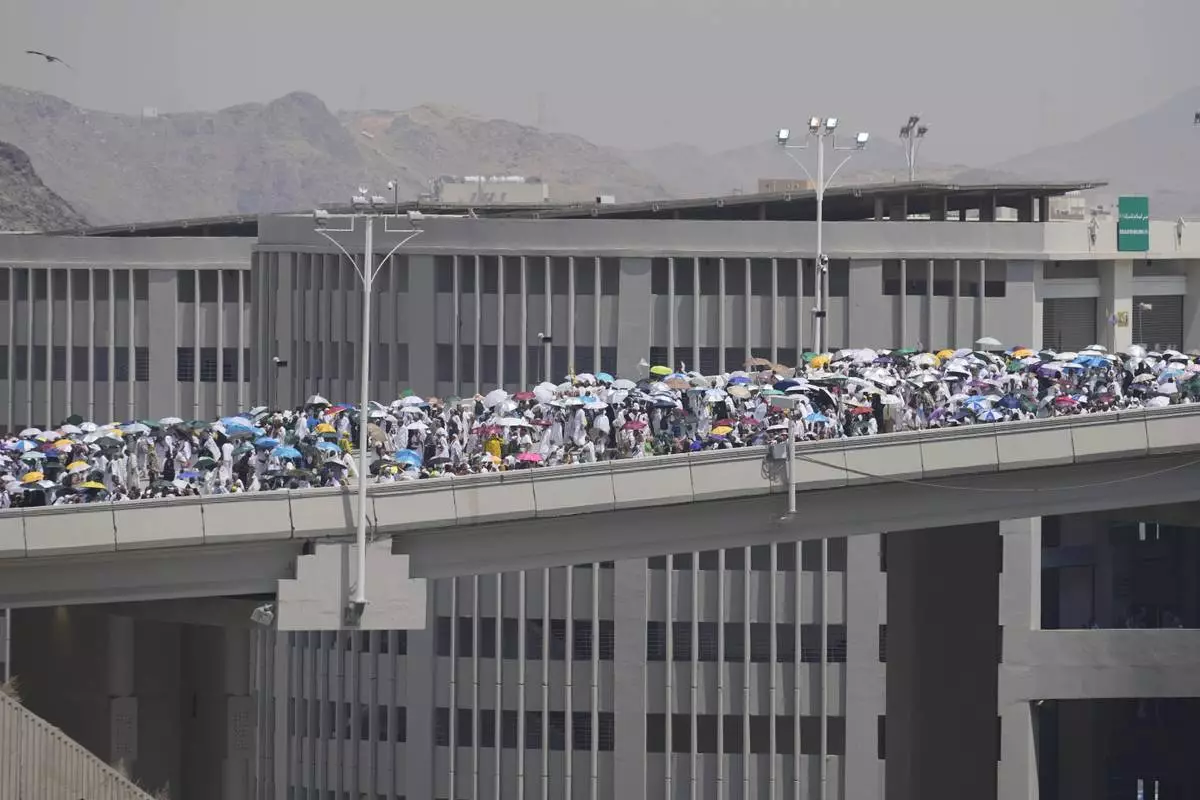
Muslim pilgrims arrive to cast stones at pillars in the symbolic stoning of the devil, the last rite of the annual hajj, in Mina, near the holy city of Mecca, Saudi Arabia, Sunday, June 16, 2024. Masses of pilgrims on Sunday embarked on a symbolic stoning of the devil in Saudi Arabia. The ritual marks the final days of the Hajj, or Islamic pilgrimage, and the start of the Eid al-Adha celebrations for Muslims around the world. (AP Photo/Rafiq Maqbool)
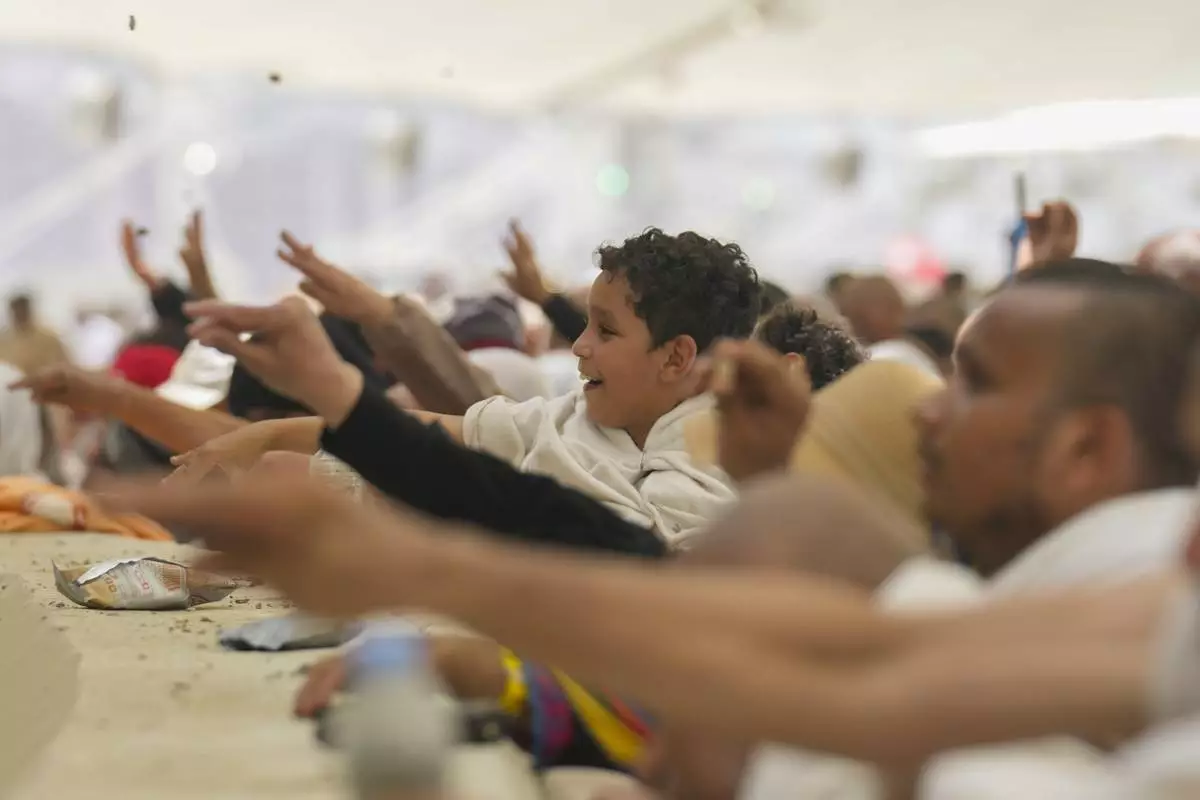
Muslim pilgrims cast stones at pillars in the symbolic stoning of the devil, the last rite of the annual hajj, in Mina, near the holy city of Mecca, Saudi Arabia, Sunday, June 16, 2024. Masses of pilgrims on Sunday embarked on a symbolic stoning of the devil in Saudi Arabia. The ritual marks the final days of the Hajj, or Islamic pilgrimage, and the start of the Eid al-Adha celebrations for Muslims around the world. (AP Photo/Rafiq Maqbool)
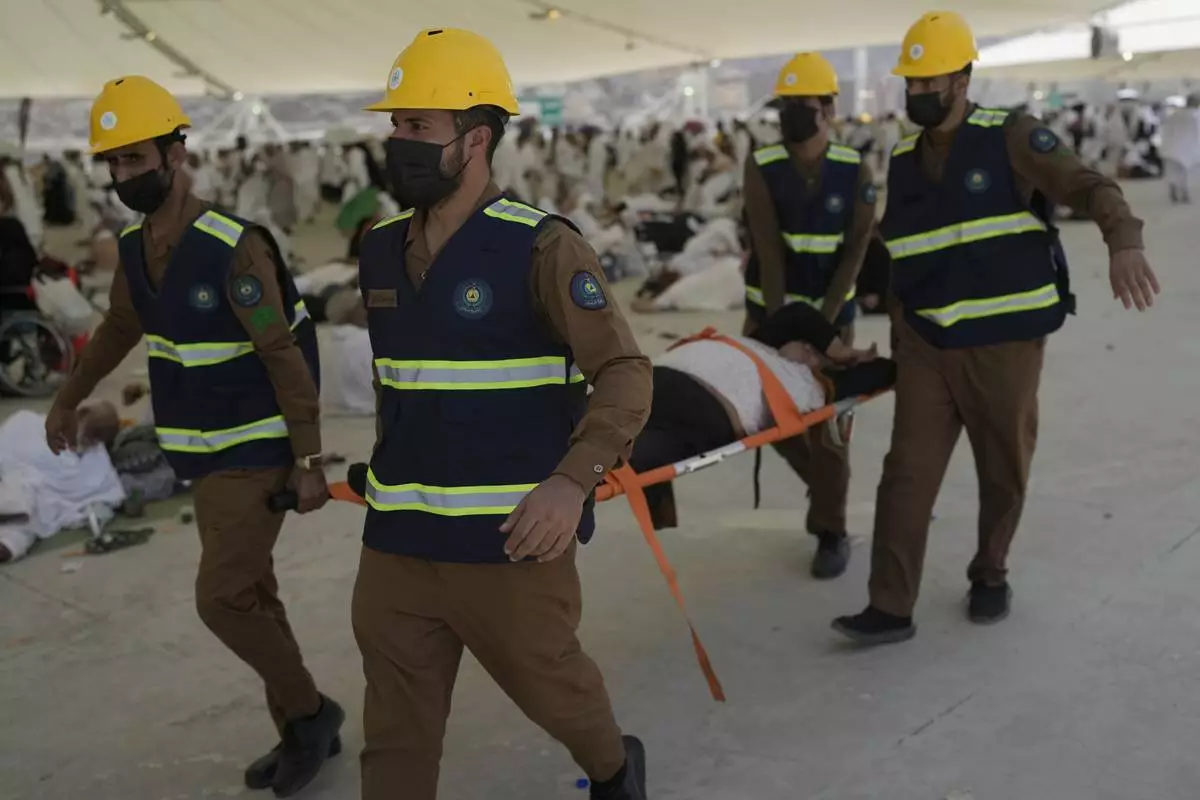
Paramedics carry a muslim pilgrim for a medical check after he fell down due to a heat stroke at pillars, in Mina, near the holy city of Mecca, Saudi Arabia, Sunday, June 16, 2024. Masses of pilgrims on Sunday embarked on a symbolic stoning of the devil in Saudi Arabia. The ritual marks the final days of the Hajj, or Islamic pilgrimage, and the start of the Eid al-Adha celebrations for Muslims around the world. (AP Photo/Rafiq Maqbool)
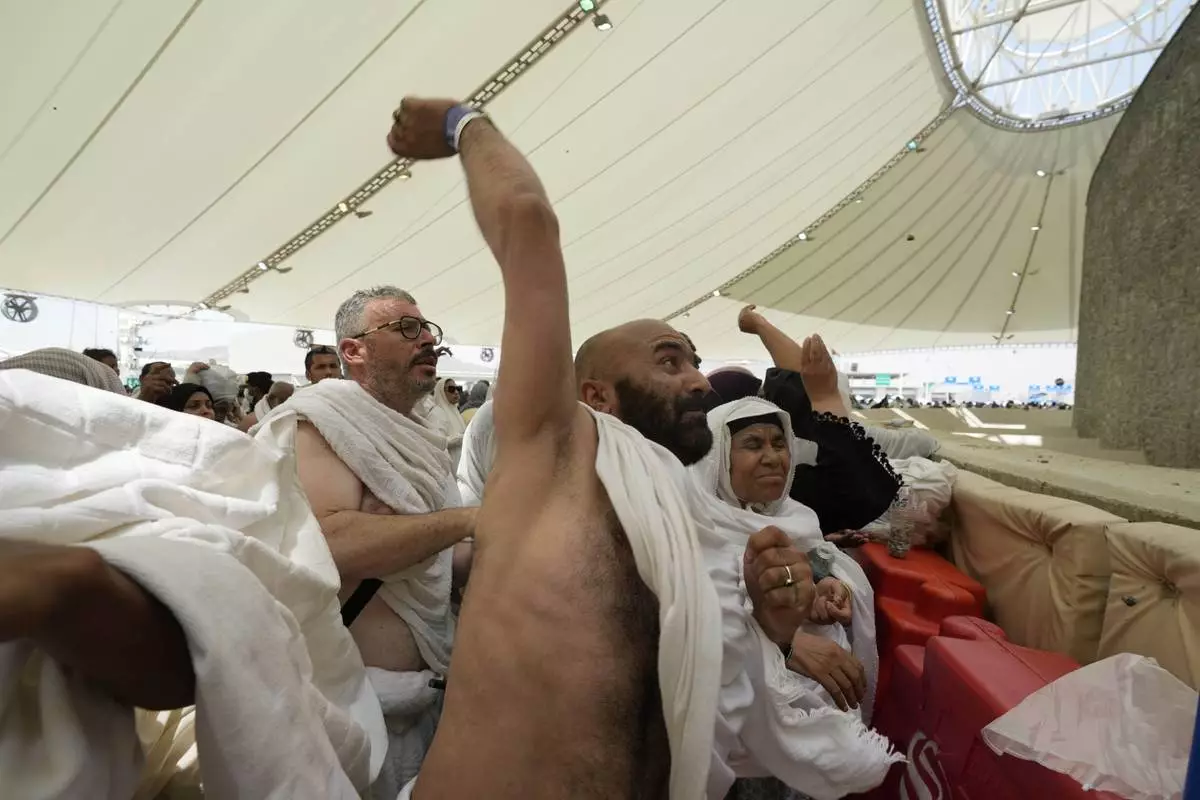
Muslim pilgrims cast stones at pillars in the symbolic stoning of the devil, the last rite of the annual hajj, in Mina, near the holy city of Mecca, Saudi Arabia, Sunday, June 16, 2024. Masses of pilgrims on Sunday embarked on a symbolic stoning of the devil in Saudi Arabia. The ritual marks the final days of the Hajj, or Islamic pilgrimage, and the start of the Eid al-Adha celebrations for Muslims around the world. (AP Photo/Rafiq Maqbool)
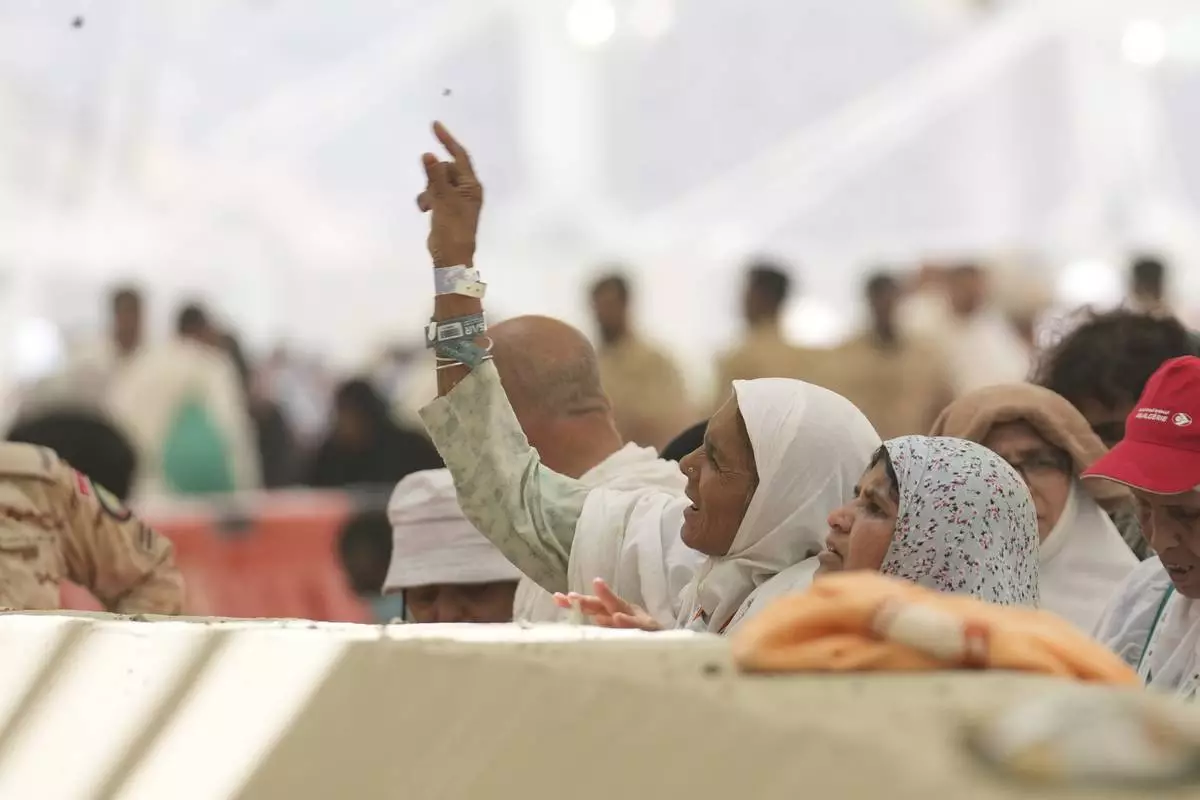
Muslim pilgrims cast stones at pillars in the symbolic stoning of the devil, the last rite of the annual hajj, in Mina, near the holy city of Mecca, Saudi Arabia, Sunday, June 16, 2024. Masses of pilgrims on Sunday embarked on a symbolic stoning of the devil in Saudi Arabia. The ritual marks the final days of the Hajj, or Islamic pilgrimage, and the start of the Eid al-Adha celebrations for Muslims around the world. (AP Photo/Rafiq Maqbool)


















